| Listing 1 - 10 of 10 |
Sort by
|
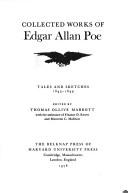
ISBN: 0674139356 0674139364 9780674139350 Year: 1979 Publisher: Cambridge (Mass.): Belknap,
Abstract | Keywords | Export | Availability | Bookmark
 Loading...
Loading...Choose an application
- Reference Manager
- EndNote
- RefWorks (Direct export to RefWorks)
Book
ISBN: 0691062374 1400873045 Year: 1973 Publisher: Princeton Princeton University Press
Abstract | Keywords | Export | Availability | Bookmark
 Loading...
Loading...Choose an application
- Reference Manager
- EndNote
- RefWorks (Direct export to RefWorks)
By attempting to suspend moral, ideological, or psychological assumptions, a phenomenological interpretation of literature hopes to reach "the things themselves," the essential phenomena of being, space, and time, as they are constituted, by consciousness, in words. Although there has been a tradition of phenomenological criticism in Europe for the last twenty years, David Halliburton is the first to write a general study of an American author from this particular point of view.The book begins with a methodological chapter that sets out the assumptions and procedures of the approach. This is followed by analyses of Poe's major works, exploring such special problems as Poe's treatment of the material world, including technology; the interrelation of body and consciousness; poetic voice; attitudes toward women; and the will to affirmation, plenitude, and unity. The center of interest is neither Poe's biography nor environment but always the meaning of Poe's words. Because these works are shaped by a single imagination and because they are experienced in time, as a process, each work has its own "way of going." The aim of the interpretation is to find this way and go along with it; to live each work dynamically, as it "happens," while tracing its interaction with other works.Originally published in 1973.The Princeton Legacy Library uses the latest print-on-demand technology to again make available previously out-of-print books from the distinguished backlist of Princeton University Press. These editions preserve the original texts of these important books while presenting them in durable paperback and hardcover editions. The goal of the Princeton Legacy Library is to vastly increase access to the rich scholarly heritage found in the thousands of books published by Princeton University Press since its founding in 1905.
Poe, Edgar Allan --- Phenomenology and literature --- -Fantasy literature, American --- -Fantastic literature, American --- American fantasy literature --- Fantasy literature, American --- Poe, Edgar Allan, --- History and criticism. --- History --- Criticism and interpretation. --- Criticism and interpretation --- Literature --- Philosophy
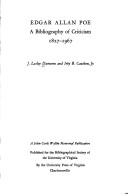
ISBN: 0813904986 Year: 1974 Publisher: Charlottesville University Press of Virginia
Abstract | Keywords | Export | Availability | Bookmark
 Loading...
Loading...Choose an application
- Reference Manager
- EndNote
- RefWorks (Direct export to RefWorks)
Fantasy literature, American --- -Fantastic literature, American --- American fantasy literature --- American literature --- History and criticism --- Poe, Edgar Allan --- -Bibliography --- -History and criticism --- Bibliography --- Fantastic literature, American --- History and criticism&delete& --- Poe, Edgar Allan, --- Po, Edgar, --- Boy, Ētkar, --- Poe, E. A. --- Poë, Edgard, --- Pui, ʼAggā ʼAyʻlaṅʻ, --- Pō, Eḍgār Ālen, --- Po, Edhar, --- Poe, Edgar Allen, --- Perry, Edgar A., --- По, Эдгар Аллан, --- По, Эдгар, --- פאו, עדגאר עלען --- פאו, עדגאר עלען, --- פא, אדגאר אלאן --- פא, עדגאר --- פא, עדגאר עלען, --- פו, אדגר --- פו, אדגר אלן --- פו, אדגר אלן, --- アランポオ, --- 愛倫坡, --- Po, Ailun, --- Quarles, --- Bibliography. --- Poe, Edgar Allen
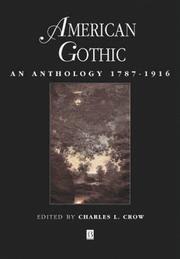
ISBN: 0631206515 0631206523 9780631206514 9780631206521 Year: 1999 Volume: *7 Publisher: Oxford: Blackwell,
Abstract | Keywords | Export | Availability | Bookmark
 Loading...
Loading...Choose an application
- Reference Manager
- EndNote
- RefWorks (Direct export to RefWorks)
American literature --- Gothic revival (Literature) --- Supernatural --- Fantasy literature, American --- Fear --- Horror tales, American --- Literary collections --- 82-312.9 --- 820 <73> --- Fantastische literatuur --- Amerikaanse literatuur --- 820 <73> Amerikaanse literatuur --- 82-312.9 Fantastische literatuur --- American horror tales --- Amerikaanse griezelverhalen --- Griezelverhalen [Amerikaanse] --- Horror tales [American ] --- Littérature américaine --- Récits d'horreur américains --- Religion --- Miracles --- American fiction --- Fright --- Emotions --- Anxiety --- Horror --- Fantastic literature, American --- American fantasy literature --- English literature --- Agrarians (Group of writers) --- United States --- Fantasy literature [American ] --- Gothic revival (Literature) - United States --- Supernatural - Literary collections --- Fear - Literary collections --- AMERICAN LITERATURE --- SUPERNATURAL --- LITTERATURE D'EPOUVANTE AMERICAINE --- NEO-GOTHIQUE (LITTERATURE) --- LITTERATURE FANTASTIQUE AMERICAINE --- LITERARY COLLECTIONS --- ANTHOLOGIES --- ETATS-UNIS
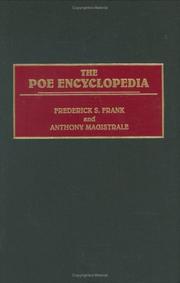
ISBN: 0313277680 0313003513 9780313003516 9780313277689 9798400697470 Year: 1997 Publisher: Westport, Conn. : London : Greenwood Press, Bloomsbury Publishing,
Abstract | Keywords | Export | Availability | Bookmark
 Loading...
Loading...Choose an application
- Reference Manager
- EndNote
- RefWorks (Direct export to RefWorks)
Fantasy literature, American --- Encyclopedias. --- Poe, Edgar Allan --- Encyclopedias --- Fantasy literature [American ] --- Fantastic literature, American --- American fantasy literature --- American literature --- Poe, Edgar Allan, --- Po, Edgar, --- Boy, Ētkar, --- Poe, E. A. --- Poë, Edgard, --- Pui, ʼAggā ʼAyʻlaṅʻ, --- Pō, Eḍgār Ālen, --- Po, Edhar, --- Poe, Edgar Allen, --- Perry, Edgar A., --- По, Эдгар Аллан, --- По, Эдгар, --- פאו, עדגאר עלען --- פאו, עדגאר עלען, --- פא, אדגאר אלאן --- פא, עדגאר --- פא, עדגאר עלען, --- פו, אדגר --- פו, אדגר אלן --- פו, אדגר אלן, --- アランポオ, --- 愛倫坡, --- Po, Ailun, --- Quarles, --- Pau, Aiḍgar Elan, --- پو، ايڈگر ايلن

ISBN: 0313309922 0313007136 9780313007132 9780313309922 9798216020264 Year: 2001 Publisher: Westport, Conn. : London : Greenwood Press, Bloomsbury Publishing,
Abstract | Keywords | Export | Availability | Bookmark
 Loading...
Loading...Choose an application
- Reference Manager
- EndNote
- RefWorks (Direct export to RefWorks)
Fantasy literature, American --- Examinations --- History and criticism. --- Fantastic literature, American --- American fantasy literature --- American literature --- Poe, Edgar Allan, --- Po, Edgar, --- Boy, Ētkar, --- Poe, E. A. --- Poë, Edgard, --- Pui, ʼAggā ʼAyʻlaṅʻ, --- Pō, Eḍgār Ālen, --- Po, Edhar, --- Poe, Edgar Allen, --- Perry, Edgar A., --- По, Эдгар Аллан, --- По, Эдгар, --- פאו, עדגאר עלען --- פאו, עדגאר עלען, --- פא, אדגאר אלאן --- פא, עדגאר --- פא, עדגאר עלען, --- פו, אדגר --- פו, אדגר אלן --- פו, אדגר אלן, --- アランポオ, --- 愛倫坡, --- Po, Ailun, --- Quarles, --- Criticism and interpretation --- Pau, Aiḍgar Elan, --- پو، ايڈگر ايلن
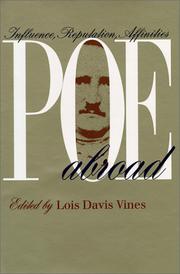
ISBN: 1587293218 9781587293214 9781587293634 1587293633 0877456976 9780877456971 Year: 1999 Publisher: Iowa City : University of Iowa Press,
Abstract | Keywords | Export | Availability | Bookmark
 Loading...
Loading...Choose an application
- Reference Manager
- EndNote
- RefWorks (Direct export to RefWorks)
In Poe Abroad, Lois Vines has brought together a collection of essays that document the American writer's influence on the diverse literatures-and writers-of the world. Over twenty scholars demonstrate how and why Poe has significantly influenced many of the major literary figures of the last 150 years.
Literature, Modern --- Fantasy literature, American --- Modern literature --- Arts, Modern --- Fantastic literature, American --- American fantasy literature --- American literature --- American influences. --- Appreciation --- Translations --- History and criticism. --- Poe, Edgar Allan, --- Po, Edgar, --- Boy, Ētkar, --- Poe, E. A. --- Poë, Edgard, --- Pui, ʼAggā ʼAyʻlaṅʻ, --- Pō, Eḍgār Ālen, --- Po, Edhar, --- Poe, Edgar Allen, --- Perry, Edgar A., --- По, Эдгар Аллан, --- По, Эдгар, --- פאו, עדגאר עלען --- פאו, עדגאר עלען, --- פא, אדגאר אלאן --- פא, עדגאר --- פא, עדגאר עלען, --- פו, אדגר --- פו, אדגר אלן --- פו, אדגר אלן, --- アランポオ, --- 愛倫坡, --- Po, Ailun, --- Quarles, --- Influence. --- Pau, Aiḍgar Elan, --- پو، ايڈگر ايلن
Book
ISBN: 019811222X 0191670715 Year: 1994 Publisher: Oxford Clarendon Press
Abstract | Keywords | Export | Availability | Bookmark
 Loading...
Loading...Choose an application
- Reference Manager
- EndNote
- RefWorks (Direct export to RefWorks)
English literature --- Thematology --- Einde van de wereld in de literatuur --- End of the world in literature --- Ethnologie dans la littérature --- Ethnology in literature --- Etnologie in de literatuur --- Extinction (Biologie) dans la littérature --- Extinction (Biology) in literature --- Fin du monde dans la littérature --- Indigenous peoples in literature --- Inheemse bevolking in de literatuur --- Myth in literature --- Mythe dans la littérature --- Mythe in de literatuur --- Overleving in de literatuur --- Populations indigènes dans la littérature --- Race dans la littérature --- Race in literature --- Ras in de literatuur --- Survie dans la littérature --- Survival in literature --- Uitsterven (Biologie) in de literatuur --- Fantasy literature [English ] --- History and criticism --- Fantasy literature [American ] --- Literature and anthropology --- Great Britain --- History --- United States --- Fantastic literature, American - History and criticism. --- Literature and anthropology - Great Britain - History. --- Literature and anthropology - United States - History. --- Extinction (Biology) in literature. --- Indigenous peoples in literature. --- Ethnology in literature.
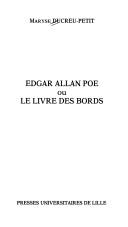
ISBN: 2859394699 275742632X 9782859394691 Year: 1995 Volume: *65 Publisher: Lille: Presses universitaires de Lille,
Abstract | Keywords | Export | Availability | Bookmark
 Loading...
Loading...Choose an application
- Reference Manager
- EndNote
- RefWorks (Direct export to RefWorks)
1848 : Edgar POE écrit EUREKA. Texte insolite, mêlant physique et métaphysique, sorte de machine à produire des sens pour l’ensemble des fictions, des fantaisies, des fantasmes. Selon POE, être poète, c’est, dans l’ordre des mots, devenir l’égal de Dieu. L’œuvre comme le monde possède sa genèse. Les personnages en sont des individus qui voyagent, qui se déplacent aux confins, sur les limites et il suffit d’un rien - miroir, double, mort vivant, diable dans le beffroi - pour que tout bascule. Tout, c’est-à-dire l’identité. Qui est cet autre issu de soi ? Que veut-il ? Quelle réponse possible à cela ? L’état le plus fréquent de l’humain n’est-il pas la catalepsie, cette suspension de l’être dans le vide ? Passages : du même à l’autre, du rêve au réel, de la raison à la folie, de la mort à la vie. Enfin, dernier avatar, de l’humain au divin. Le texte ici présenté se propose d’explorer toutes les errances, grotesques ou sérieuses, où s’aventurent les personnages de POE. Abolition des différences, effacement des bornes, perméabilité des limites : les transgressions s’accumulent. On le voit bien : Usher et Valdemar, Morella et Pym ne sont aux marges que pour les franchir, borderliners hantés par l’œil rond du cyclone, du gouffre ou de la victime. Tous sont guettés par un maëlstrom, flanc tournoyant de la mort qui tue le temps et la raison. Est-il possible d’en sortir, de franchir la passe, de traverser l’épreuve ? Est-il une issue à cette dissolution des êtres ? Oui, à l’évidence : la Création. Il faut donc réinventer le monde. Concurrencer, plagier Dieu, devenir son égal, son double. Au terme de l’errance fantasmatique, nous découvrons ce qui, peut-être, est à l’origine du cri « Eurêka » : l’œuvre de POE est aussi une théologie.
Poe, Edgar Allan --- Fantasy literature, American --- History and criticism. --- 820 "18" POE, EDGAR ALLAN --- -Fantastic literature, American --- American fantasy literature --- American literature --- Engelse literatuur--19e eeuw. Periode 1800-1899--POE, EDGAR ALLAN --- History and criticism --- -Criticism and interpretation --- -Engelse literatuur--19e eeuw. Periode 1800-1899--POE, EDGAR ALLAN --- 820 "18" POE, EDGAR ALLAN Engelse literatuur--19e eeuw. Periode 1800-1899--POE, EDGAR ALLAN --- Poe, Edgar Allan, --- Po, Edgar, --- Boy, Ētkar, --- Poe, E. A. --- Poë, Edgard, --- Pui, ʼAggā ʼAyʻlaṅʻ, --- Pō, Eḍgār Ālen, --- Po, Edhar, --- Poe, Edgar Allen, --- Perry, Edgar A., --- По, Эдгар Аллан, --- По, Эдгар, --- פאו, עדגאר עלען --- פאו, עדגאר עלען, --- פא, אדגאר אלאן --- פא, עדגאר --- פא, עדגאר עלען, --- פו, אדגר --- פו, אדגר אלן --- פו, אדגר אלן, --- アランポオ, --- 愛倫坡, --- Po, Ailun, --- Quarles, --- Criticism and interpretation. --- Poe, Edgar Allen --- Fantasy literature, American - History and criticism. --- littérature --- précipice

ISBN: 157113218X 1571133577 1571138943 1571136215 Year: 2004 Publisher: Rochester (N.Y.) : Camden House,
Abstract | Keywords | Export | Availability | Bookmark
 Loading...
Loading...Choose an application
- Reference Manager
- EndNote
- RefWorks (Direct export to RefWorks)
Controversies abound in studies of Edgar Allan Poe. From the time of his death well into the twentieth century, partisans debated the issue of his character: was he an alcoholic? drug addict? pathological liar? necrophile? In the 1920s and 30s, psychoanalytic critics sought to divorce the study of Poe from Victorian moral concerns but in the process made scandalous claims by linking Poe's dream-like stories to his personality. The status of Poe's literary productions was similarly disputed; dismissed by the New Critics but championed by poets such as William Carlos Williams and Allen Tate. Recent scholars have debated the meaning and significance of Poe's representations of race, class, and gender, often returning to the character issue: how racist and misogynist was he, and how important are those questions to understanding his work? Finally, how have the seemingly countless plays, films, novels, comic books, and pop music experiments based on his image and works intertwined with academic study of Poe? This book examines these and other controversies, shedding light on broader issues of canon formation, the role of biography in literary study, and the importance of integrating various, even conflicting interpretations into one's own reading of a literary work. This book will be of great interest to Poe scholars, both those who have been a part of the literary battles described above and newcomers to the field who can use the book as a guide to the field of Poe studies, and to all those interested in Poe and his work. Scott Peeples is associate professor of English at the College of Charleston.
Fantasy literature, American --- History and criticism --- Theory, etc. --- Poe, Edgar Allan, --- Criticism and interpretation --- History. --- Fantastic literature, American --- American fantasy literature --- American literature --- Poe, Edgar Allan --- Poe, Edgar Allen --- Po, Edgar, --- Boy, Ētkar, --- Poe, E. A. --- Poë, Edgard, --- Pui, ʼAggā ʼAyʻlaṅʻ, --- Pō, Eḍgār Ālen, --- Po, Edhar, --- Poe, Edgar Allen, --- Perry, Edgar A., --- По, Эдгар Аллан, --- По, Эдгар, --- פאו, עדגאר עלען --- פאו, עדגאר עלען, --- פא, אדגאר אלאן --- פא, עדגאר --- פא, עדגאר עלען, --- פו, אדגר --- פו, אדגר אלן --- פו, אדגר אלן, --- アランポオ, --- 愛倫坡, --- Po, Ailun, --- Quarles, --- Allen Tate. --- Edgar Allan Poe. --- New Critics. --- Poe scholars. --- Poe studies. --- Scott Peeples. --- Victorian moral. --- William Carlos Williams. --- alcoholic. --- biography. --- canon formation. --- character. --- class. --- controversy. --- dream-like stories. --- drug addict. --- gender. --- literary productions. --- necrophile. --- pathological liar. --- personality. --- psychoanalytic. --- race. --- scholarship.
| Listing 1 - 10 of 10 |
Sort by
|

 Search
Search Feedback
Feedback About UniCat
About UniCat  Help
Help News
News